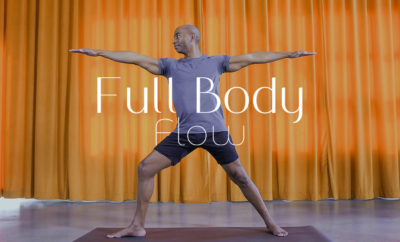The (Science-Backed) Power of Yoga in Addiction Recovery

PowerofYogainAddictionRecovery Feature
A many-layered and complex issue, addiction is something that looms large across our society, culture and personal lives. It is, unfortunately, also a taboo subject, despite being so widespread.
In addition to outright addiction, it can also be argued that a large amount of people feel bound by patterns of behavior and compulsive actions that are detrimental to their health and happiness.
Yoga therapy for addiction helps people to build self-awareness, strength, clarity of mind, and resilience.
Through growing research, yoga’s place as a potentially powerful tool in addiction recovery has begun to emerge.
When tailored appropriately for addicted individuals, yoga therapy for addiction helps people to build self-awareness, strength, clarity of mind, and resilience – and also promotes positive physical and psychological changes.
All this creates another layer of protection against relapse and provides an accessible source of strength and relaxation through the sometimes challenging journey of recovery.
A Background On Addiction In the USA
When we consider addiction, illicit drug use is often the first thing that comes to mind – and with drug overdose deaths in the US more than tripling since 1990, the consumption of illegal drugs is highly problematic.
However, prescription drugs (such as opiate painkillers and benzodiazepines) also pose a huge problem.
In 2017, an estimated 18 million people (more than 6% of those aged 12 and older) misused prescription medications at least once over that year alone.
Addiction is associated with changes in brain chemistry that make it extremely difficult to resist cravings, even if they are aware of the negative impact it is having on their life.
Yet perhaps our biggest addiction issue is alcohol, with over 14 million US citizens aged 18 and older suffering from Alcohol Use Disorder.
From cocaine, to gambling, to cigarettes – whatever a person is addicted to – addiction is associated with changes in brain chemistry that make it extremely difficult to resist cravings, even if they are aware of the negative impact it is having on their life.
Addiction can also be tied to mental health issues such as anxiety, PTSD, schizophrenia and depression, as people both attempt to self-medicate or become more likely to partake in risky behavior through emotional distress and lack of self-regard.
Understanding Brain Changes in Addiction
No one ever plans to become an addict, but addiction – a word which is derived from the Latin for “enslaved by” or “bound to” – can quickly entangle people, regardless of their intentions.
This is because addiction, far from being an issue of willpower or moral fiber, physically changes the brain in a variety of hard-to-overcome ways:
- Addictive substances and behaviors affect the brain’s “reward circuit,” flooding it with the chemical messenger dopamine and creating a sense of contentment, excitement or euphoria
- We evolved to seek these emotions by engaging in helpful behaviors – such as eating or spending time with loved ones. But addictive drugs and behaviors provide a shortcut, flooding the brain with dopamine and other neurotransmitters in far greater levels than can usually be achieved naturally
- The levels of dopamine released, how intense the release is and the speed of the release are all related to how addictive a drug or behavior is – which is why substances like heroin, barbiturates, methamphetamines and alcohol are considered particularly dangerous
- Over time, the brain adapts in a way that actually makes the sought-after substance or activity less pleasurable. We therefore need more in order to achieve the same high – an effect known as tolerance.
The way in which the area of the brain responsible for the “reward” feeling and the prefrontal cortex (involved in our higher functions such as decision making) communicates is also altered - Through these changes, we begin to deride less pleasure in positive activities we once found fulfilling. Our capabilities for judgment, learning, decision-making and self-control become severely compromised.
Finally, we experience intense psychological and sometimes physiological longing for the substance we are addicted to, and will compulsively seek it to the detriment of our wellbeing, relationships and financial health
Why People Are Using Yoga During Addiction Recovery
Addiction is a complex and difficult problem, and overcoming it is rarely straightforward. However, it is possible to both manage and treat addiction, even if it’s something that has to be taken into account – like a chronic illness – over the course of many years.
Encouragingly, yoga and mindfulness are increasingly being recognized as helpful ways to augment traditional addiction recovery treatment plans and help people move on to a healthier and happier life.
Addicts seeking help may be offered talking therapies such as Cognitive Behavioral Therapy (CBT), pharmaceutical treatment for any underlying mental health issues and be directed towards group support, such as Alcoholics Anonymous.
They may also need medical supervision if going through a planned withdrawal, and in certain cases enter residential rehab. Yoga is not a replacement for any of these medical responses, but evidence does suggest that when used alongside traditional treatment, yoga can lead to better outcomes.
Addiction Recovery and How Science Shows Yoga Therapy Can Help
In 2014, a Swedish study published in the Complementary Therapies in Medicine journal focused on 18 people working to overcome alcohol dependence.
While the control group received traditional treatment, the other followed a traditional treatment plan with yoga used as an adjunct therapy – and showed the most significant reduction in drinking. While small, this study hints at the promise of yoga in rehabilitation, and joins other positive research into this subject.
For example, a 2016 study from the Nursing Research journal indicated that yoga could help improve the mood and quality of life of female heroin users going through medical detox.
Yoga and mindfulness are increasingly being recognized as helpful ways to augment traditional addiction recovery treatment plans
And while they acknowledged that this is still a young area of scientific research, this 2018 overview recognized that mindfulness-based interventions “may be efficacious treatments for addiction,” with a recent analysis confirming that mindfulness supports a reduction in craving and substance abuse.
Evidence suggests that yoga and mindfulness has a positive influence on the neurobiology of addiction through helpful brain changes that restore balance to the addicted mind.
Trying to transition back from the abnormal functioning of the brain that is key to addiction (driving the obsessive need to take drugs or repeat harmful behaviors) is hugely challenging. In some cases, it can even be life-threatening, should withdrawal not be properly managed in a medical setting.
The brain can heal itself, however, with ongoing abstinence from the substances or behaviors an individual is addicted to.
Therapy and traditional treatment are hugely important parts of allowing this to happen, but yoga can be a self-help tool that both bolsters positive brain changes and supports people’s efforts to manage their emotions as they recover.
While quitting an addictive substance or activity will only sometimes lead to physical withdrawal, it will create in all cases a state of psychological withdrawal.
This can include feelings of agitation, anxiety, fatigue, anhedonia (an inability to experience pleasure), insomnia and depression – all of which are highly uncomfortable and can stymie a person’s attempts to overcome their addiction.
With ongoing abstinence from the substances or behaviors an individual is addicted to, the brain can heal itself from patterns of addiction.
Yoga reduces perceived stress and anxiety and modulates the body’s stress response, balancing some of the stress hormones like cortisol and adrenaline.
The Journal of Alternative and Complementary Medicine also reported on a study that showed an increase in the levels of gamma-aminobutyric acid (GABA) – higher levels of which are associated with less anxiety and stress – with the practice of yoga techniques.
There’s even evidence to suggest that a regular yoga practice enhances grey matter and enlarges regions of the brain like the hippocampus that are active in controlling stress.
The American Addiction Center describes yoga for addition recovery as a great supportive practice.
The Power of Yoga in Addiction Recovery: The Takeaway
By allowing us to feel more in tune with our bodies and building our resiliency to physical stress through yoga poses we find challenging, we become better able to cope with the slings and arrows of life without falling into destructive habits.
As a self-help method, yoga can teach anyone that they can transcend the negative patterns of thought and action, and give them a spiritual framework for life – which they can choose to embrace as much or as little as they feel comfortable with.
With addiction being such an important public health issue, the fact that evidence indicates that yoga is an effective, safe and accessible supporting therapy in cases of addiction is encouraging.
Giving people more methods to manage their own addiction recovery both empowers them and reduces their risk of relapse – and all the personal heartache and public cost associated with it.
By offering people another source of support as they move on from addiction, yoga therapy to help with addiction recovery can help people realize their potential and forge a happier future.
This article and all included information is not intended as medical advice and does not treat or diagnose. Please consult your doctor for any health or addiction-related questions or concerns.
Do you or someone you know need help with addiction? The Substance Abuse and Mental Health Services Administration (SAMHSA) offers a 24-hour free and confidential treatment referral and information helpline: 1-800-662-HELP (4357)


This Month's Letter
From the Editor
Monthly motivation and food for
thought from our founder.






























